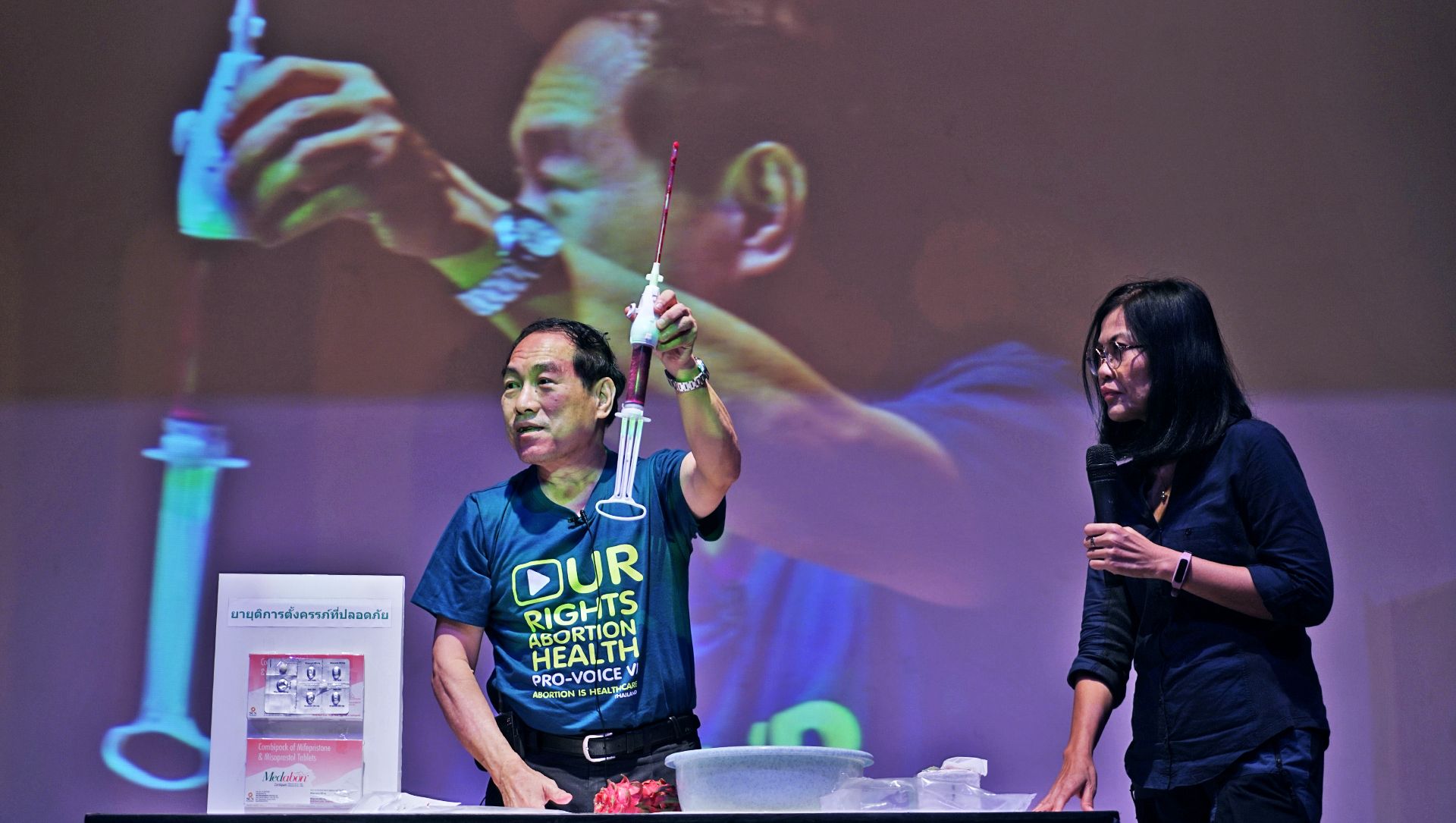Top: Sunya Patrachai, a Mahidol University OB/GYN professor, waves a suction tube used in vaccum-aspiration abortions. Photo: Coconuts
The man on stage pulled a thin plastic tube out of a dragon fruit before a captivated audience. A little “blood” seeped out; the audience gasped. The man was a gynecologist, the dragon fruit was standing in for a uterus, and with the tube he was demonstrating vacuum-aspiration abortion.
“Abortion has been performed for thousands of year, but in the last century, we have new technology that’s made the process completely safe, like this equipment right here,” said Sunya Patrachai, an OB/GYN professor at the renowned Mahidol University, as he waved the tiny suction tube in the air. “Yet, only 30 percent of all doctors performing abortions in Thailand use this method.”.
The professor’s display was meant to demystify and destigmatize abortion for the audience gathered Wednesday afternoon at the Bangkok Art and Culture Centre in the run-up to International Safe Abortion Day. He was among several speakers to take turns talking about their experiences performing or receiving abortions. Their consensus was that while safe, legal abortions are available, they remain out of reach for many Thais.
Though it remains a common misconception that abortions are difficult to obtain in Thailand, they are legal on a de facto basis given the broad exceptions in the law.
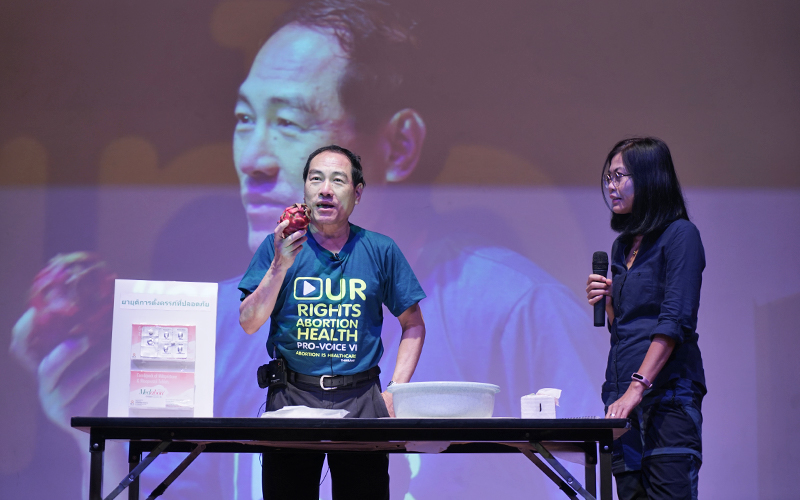
While the Penal Code makes providing an abortion a criminal act punishable by up to three years in prison and a fine of THB6,000 (US$185), its exceptions include when pregnancy results from rape or a woman faces a physical or mental health risk. The last two criteria can be broadly interpreted enough to apply to many procedures.
The procedure – safe, legal or otherwise – is common in all socioeconomic groups, and a 2014 study estimated that 300,000-400,000 abortions are performed annually in the kingdom.
On stage, Sunya, said proudly that he always perform abortions for those eligible when they request it.
“I believe it’s our responsibility to do our job, not to lecture these women on morality. … It’s not like I have that great of morals anyway,” he said jokingly as the room erupted with chuckles.
Wednesday’s event was organized by government agencies including the Health Ministry, multiple NGOs and The Canadian Embassy to raise awareness and help normalize reproductive health rights prior to Saturday’s International Safe Abortion Day.
Limited Options
The primary method for safe abortions in Thailand is the so-called abortion pill. Today the Health Ministry imports a relatively new brand called Medabon, which was only added to the kingdom’s essential drug list in 2016.
“What I like about the pill is the fact that women can use it themselves at home. … This pill is very, very safe. I think it should be sold at 7-Eleven, but the important thing is using the right dose, because it might not work if the dose is too small,” Sunya said.
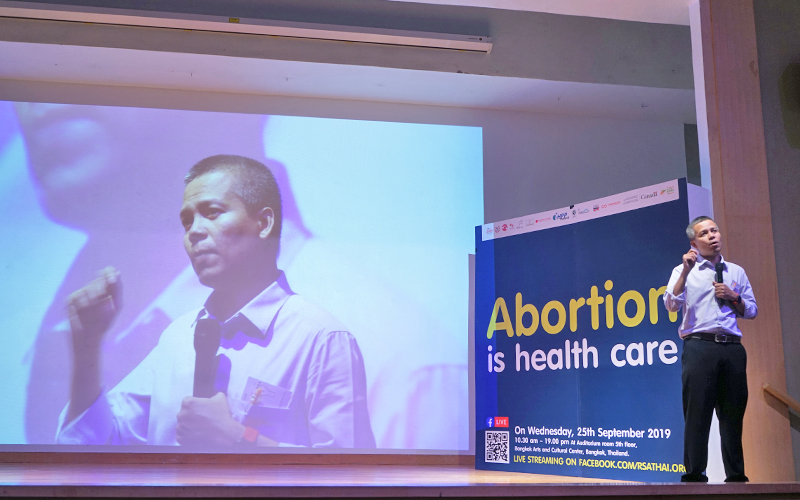
Another gynecologist who spoke at the event told Coconuts Bangkok that, since the drug is on the government’s essential drug list, it is available for free at state hospitals.
“However, women still need to pay some service charge for the hospital visit,” said Thanapan Choobun, an OB/GYN professor at the Prince of Songkla University. The fee varies from hospital to hospital – from a few hundred to a few thousand baht – as well as a patient’s visa status.
Dual-pricing for foreigners now legal at Thai public hospitals
Though the law tacitly allows women to terminate most unplanned or unwanted pregnancies, the practical reality of obtaining one depends on the attitudes of medical practitioners and hospital or clinic administrators.
In short, its left to a doctor’s discretion to perform the procedure or turn a woman away.
It was during his demonstration of the second safe method, vacuum aspiration, that Sunya made the crowd gasp at the dragonfruit “blood” sucked into the tube.

Sunya demonstrates an vacuum-aspiration abortion procedure.
He explained how the uterine contents are emptied by suction applied through the thin tube inserted into the uterus. Women only loses 60-to-70 cubic centimeters of blood with this method, Sunya noted from the stage.
“That’s less than a bottle of 5-baht bottle of Lactasoy,” whispered Supecha Baotip – founder of TamTang, an online NGO that provides information about safe abortions to women, causing a reporter to giggle inapprotately.
Supecha is no stranger to the procedure as she openly discusses the vacuum aspiration she experienced 16 years ago.
“I was 25 when I got pregnant, with no doubt in my mind that I was not ready,” she said in an interview last year.
Read: Know Nothing, Say Nothing: What it’s truly like to get an abortion in Thailand
Though her procedure went well, she admits that it was done illegally back in a time when society did not talk about abortion. Out of desperation, she found a clinic via a tiny poster stuck on the walls of a songthaew, a passenger truck with benches in the back.
“Can you believe I got abortion information from a ghetto truck? How safe do you think that can be?” she said. But while safe abortions have become more accesible, Supecha – who said she recieves dozens of calls from women with unwanted pregnancies daily – said that’s not the case nationwide.
“Abortions are only easily accessible if you have the money and are in big cities,” she said. A vacuum aspiration procedure can cost up to THB5,000 (US$150) – an amount roughly 15 times the daily minimum wage. Moreover, there are currently only about 100 hospitals and clinics in all of Thailand that are part of the Referral System for Safe Abortion network and considered pro-choice.
Thus, for women living in rural areas, getting an abortion can be an insurmountable difficulty.
Stigma and Law
The consensus of the many women who have undergone abortions, according to the activists, doctors and academics who took the stage Wednesday, was that a woman should have the right to decide what to do with her body. Especially if an abortion is going to happen anyway, society and the law should encourage women to do it legally and safely.
Others at the event advocated for the full decriminalization of abortion, including a group of women who registered her opposition on stage by wrapping themselves in white cloth and a rope, struggling to break free.
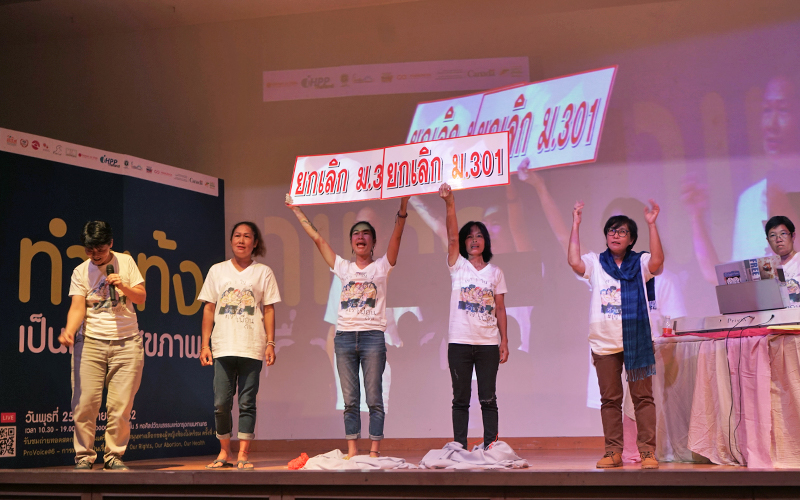
Supecha Baotip, at far left, with fellow pro-choice advocates calling for the full decriminalization of abortion in Thailand. Photo: Coconuts
The same group of activists conducted a similar protest last year at the Constitutional Court.
Thai pro-choice medical network campaigns for the right to safe abortions
Thanapan said that legal changes may take a long time.
“It’ll be great if the law could change but this is a cursed topic in the Thai parliament. Every time someone brings it up, the parliament always falls apart due to other reasons. So nothing has changed in decades. So I think we must change society’s mentality first,” he said, adding that he is hopeful that a true shift will be brought upon by the new generation.
“We’re talking about people’s beliefs and their emotions, I don’t know if that can be changed in my lifetime even. But it’s okay, because I’m not expecting to change everyone in society’s minds. If I can help the new generation develop more of understanding about female reproductive rights, that would make me happy.”
To obtain more information regarding safe abortions in Thailand visit the Referral system for Safe abortion, Love Care Station, TamTang or dial the unplanned pregnancy hotline at 1663.
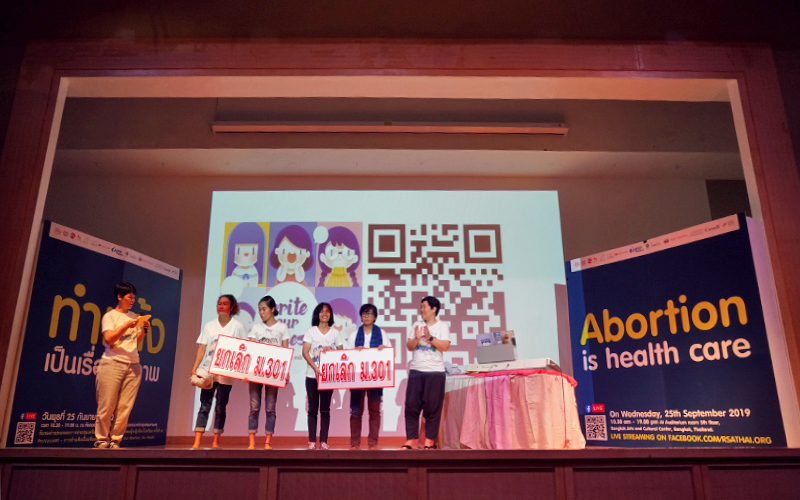
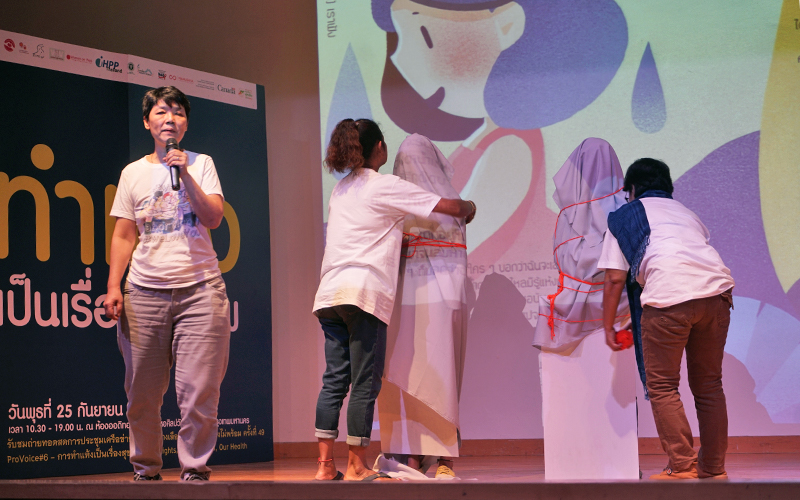
Related:
Know Nothing, Say Nothing: What it’s truly like to get an abortion in Thailand
Thai pro-choice medical network campaigns for the right to safe abortions (PHOTOS)
